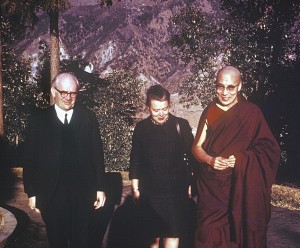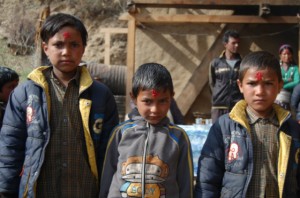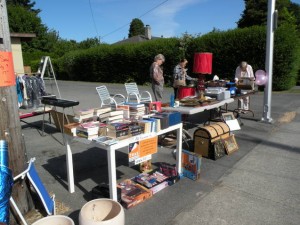Honouring the Centenary of George Woodcock’s birth – May 8, 2012

TRAS is well into the celebrations for the 50th anniversary of its founding by George Woodcock – and now we honour the 100th anniversary of George’s birth!
One hundred years ago, on May 8, 1912, George Woodcock was born in Winnipeg, Manitoba. He was soon taken back to England by his parents to a rather austere life – and who would have thought that 100 years later we would be honouring the memory of a man who became one of Canada’s most celebrated men of letters and the founder of not one but three charities which have helped thousands of people at home and abroad!
Alan Twigg, author and publisher of BC Book World, recently wrote Tibetans in Exile about the Woodcocks, their extraordinary lives and the impact they had on so many people through their charitable work.
We at TRAS are well aware of the story of how one couple from Vancouver quietly made such a difference, but for the sake of newer TRAS members, allow us to introduce you to George Woodcock and his wife, Inge.
George became Canada’s most prolific and remarkable man of letters. He returned from England in 1949 to build a cabin in Sooke, British Columbia, with his German-born wife Ingeborg. They struggled in those early days, but eventually George went on to write and edit over 150 books. He taught English literature at UBC, and some of his students are still members of the charities he founded.
In 1961, George went to India to do research for a book. And that’s when the coincidences – or karma – began. Inge had always been fascinated by Tibet, and seeing the word on a door at All India Radio in Delhi, she knocked and went in. The meeting with the Tibetan couple working there (broadcasting world news into an occupied Tibet) led to the Woodcocks going to the hill station of Mussoorie, where a Tibetan noblewoman, Mrs. Rinchen Taring, and her husband Jigme had started an orphanage and school. The Woodcocks were moved by the plight of the children in ragged clothes and no shoes, sleeping five to a mattress with one thin blanket in the Himalayan winter and surviving on thin soup and momos, steamed wheat dumplings. Lessons were held outside on the ground, because there was no building large enough to hold the hundreds of children recently arrived from Tibet. The incidence of sickness and death was high. When George and Inge expressed their dismay and wondered how to help, a young Tibetan girl, Khando, told them that they “must absolutely come and see Uncle!” Khando was the Dalai Lama’s niece.
A long journey to Dharamsala led to the meeting which changed the Woodcocks’ lives forever, and through them, the lives of countless Tibetan refugees. They discovered a similar scene of dire need at the nursery run by the Dalai Lama’s sister. Their 20 minute meeting with the young Dalai Lama stretched to two hours, ranging over Buddhism, the future of Tibet, the plight of the refugees and the plans that had been growing in the Woodcocks’ minds to found some kind of organisation in Canada for aiding the Tibetans.
The result, on their return to Vancouver, was the founding of the Tibetan Refugee Aid Society, the humanitarian aid society that is still going strong under its current name, Trans-Himalayan Aid Society, with more than 300 projects completed in the Himalayas and southern India.
In fact, they did not wait to return home but wrote ahead to colleagues at the University of British Columbia to start collecting funds. John Conway, a founding member, remembers George’s facility at getting help: the first President was Dr. Norman MacKenzie, President of UBC; the UBC treasurer became the TRAS treasurer, and many professors sat on the board. Their friends in the artistic community were put to work too, designing Christmas cards and donating paintings. George and Inge led by example – no-one worked harder than they did. Once cajoled (or bullied!) into helping, their friends had no choice but to follow suit. Dorothea Leach, now a Patron of TRAS, recalls that only a broken limb would be a good enough excuse to miss the weekly stints at garage sales and flea markets which were the early fundraisers for TRAS.
In the first year TRAS raised $11,436.61 from those weekly flea markets, book and outgrown children’s clothing sales (and the sale of 14,000 of the Christmas cards!) for the Tibetan children. In the years that followed, TRAS helped to fund the growth of the Tibetan Homes Foundation in Mussoorie and the Tibetan Children’s Village in Dharamsala, building homes, classrooms, vocational training workshops, and housing for the elderly who had no ancestral village to return to. A sponsorship scheme was also started to cover the day-to-day costs of looking after the children.
Gradually TRAS helped with the establishment of small settlements in north India and the larger ones in the south. branching out to help Indian villagers and tribal people in the same regions. George was always ready to write about and work for the next urgent need, and he was instrumental in having the Canadian Government bring in the first planeload of Tibetans to settle in Canada in 1972. This was followed by his vigorous support for the Vietnamese Boat People, with TRAS raising funds to resettle several families in BC.
The Woodcocks were an inspirational couple who affected millions of lives with their charities (their second charity is Canada-India Village Aid, the third being a fund for writers in need) and yet they avoided all publicity for their good works. Barry Leach wrote that, in founding TRAS, “this gentle, kindly man made three valuable contributions. He provided a vehicle for many Canadians to express their concern for the plight of the Tibetan people in generous and tangible forms. He contributed to the international effort to relieve and rehabilitate thousands of refugees. In doing so, he shared in the preservation of an ancient culture that has already demonstrated its relevance and value to the modern world. Through the person of the Dalai Lama, it has encouraged non-violence in politics, compassion for all sentient beings and concern for the environment. Utopian as they may seem, these attitudes offer the only long-term hope for the resolution of the problems that beset mankind today. Furthermore, these themes echo the tenets of intellectual anarchism that underlay all of George’s thought and writing and explain the intuitive understanding that existed between him and the Dalai Lama from their very first meeting”.
George’s writing continues to influence Canadians today. A new friend of TRAS, Ryan Andrew Murphy, writes “George Woodcock’s thoughtful writings on politics and history have informed and profoundly shaped my thinking. His sensitivity and insights always make opening one of his books a rewarding and enriching experience. His enormous, seminal contributions to Canadian culture are indisputable, but much more broadly, I believe our country and our world are profoundly in his debt. He unassumingly assumed the role of public intellectual, and in so doing helped initiate the formation of a conscientiously intellectual public.”
The Woodcocks opted out of active TRAS work after George had a heart attack in the early 1970s, but he and Inge remained at the forefront of fundraising efforts for some years. TRAS has maintained their ideals and continued the work for 50 years and those of us who knew George continue to be inspired by his example.
George died in 1995, shortly after being given the Freedom of the City of Vancouver. Inge remained a Patron of TRAS, vitally interested in every aspect of our work, until she died in 2003.
The Tibetan community in BC remembers the Woodcocks with fondness. T.C. Tethong of Victoria, BC, wrote, at Inge’s passing, “Tibetans owe much to these two kind souls from Canada for their initiative and dedication in starting TRAS, the first Canadian aid organization for Tibetan refugees. These two Canadians and their friends helped the Tibetans in our hour of need and always remained our close friends.”
If you would like to learn more about the Woodcocks and the charities they founded, TRAS has Alan’s book for sale. Call 604-224-5133 or email info@tras.ca.
(With thanks for excerpts from Alan Twigg, (Tibetans in Exile) T.C. Tethong, and the late Barry Leach (TRAS newsletters) and conversations with Dorothea Leach, John Conway and Ryan Andrew Murphy)
Celebrate the centenary of George Woodcock’s birth at the annual award ceremony for the winner of the George Woodcock Lifetime Achievement Award for a BC writer.
Speeches and readings in honour of George. TRAS will have a table and display there.
Date: Thursday, June 28, 2012
Time: 6:30pm
Location: Vancouver Public Library, Alice MacKay Room
More info: BC Bookworld (http://www.bcbookworld.com/) and George Woodcock Lifetime Achievement Award (http://www.georgewoodcock.com/index.html)


